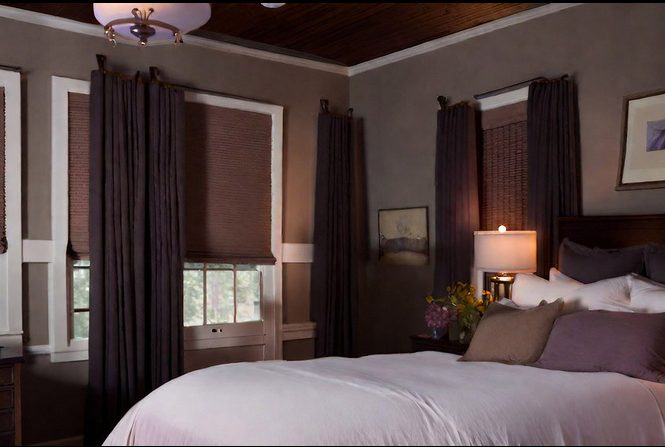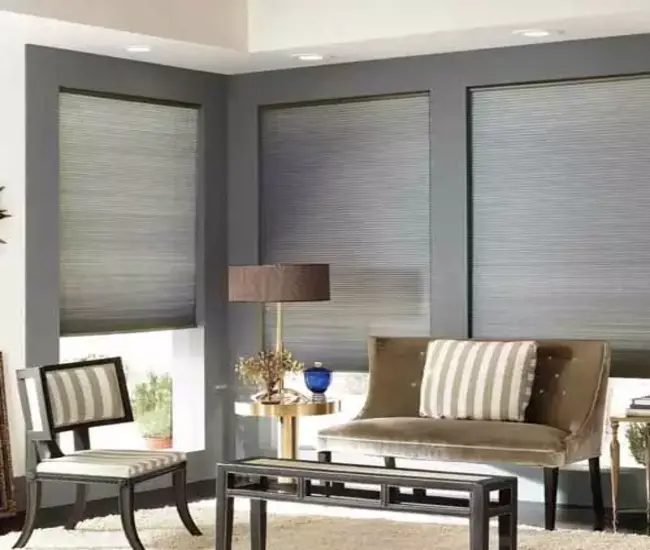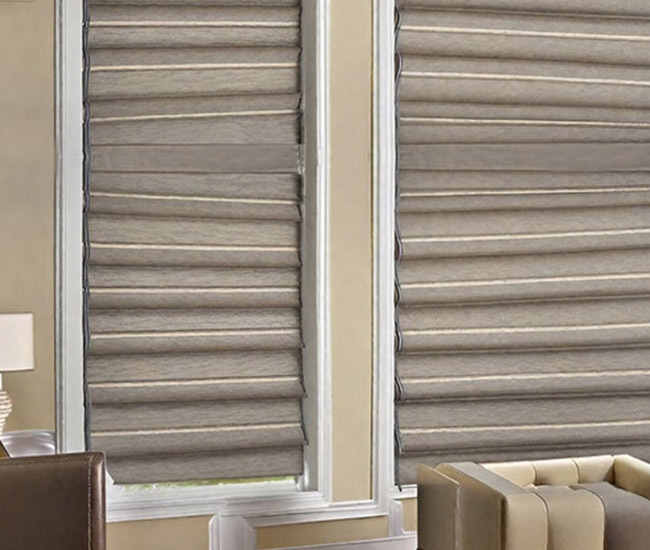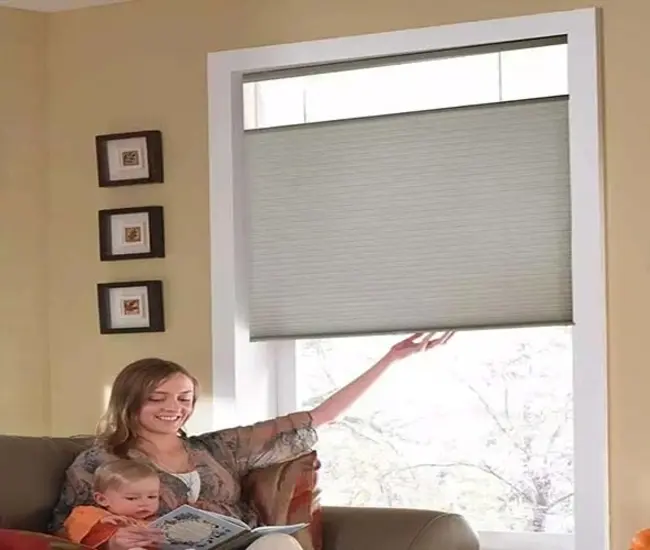Can’t decide between blinds and cellular shades? Take a look at our detailed comparison chart and the pros and cons of each type to make the best choice for your home or commercial space.
Honeycomb or cellular shades and blinds are popular choices for treating windows in homes and offices. Both types of window treatments come with a broad range of options in color, material, style, and lift option. Also, each comes with a cordless lift to provide safety for your kids and pets, and you can get them custom cut to fit any window.
If you’re unsure which is better, blinds or cellular shades, read this comparative analysis of the pros and cons of each type of window treatment.
Scroll on to learn more about the differences and advantages and disadvantages of blinds and cellular shades.
Blinds vs Cellular Shades – a Comparative Analysis
Energy Saving
Cellular shades are better for insulation and energy efficiency, while some blinds, like blackout blinds, also insulation well. Cellular shades can reduce heat loss through windows by 40% or more in the winter and reduce solar heat by up to 80% in the summer.
Light Control

Blinds with slatted construction are better for adjusting light levels and privacy, while cellular shades are better for overall light filtering.
Noise
Blinds can make noise when adjusting their slats, while shades go up and down smoothly.
Style
Made from a single piece of fabric, shades give a more streamlined look, while blinds offer more versatility with slat sizes and angle of tilting.
Operation
Slats of blinds stack at the top to open, while cellular shades roll up as you raise them.
Cleaning

Blinds are easy to wipe down with a soft cloth, while cellular shades are difficult to clean as their honeycomb cells tend to trap dust and dirt.
Durability
Since they are made from rigid materials, blinds are more durable than cellular shades.
Why are Honeycomb Shades Better Than Blinds?

There is a common belief that cellular shades are a better choice. Here are the reasons why some homeowners might prefer cellular shades over traditional window blinds:
Energy Efficiency
Cellular shades are hailed for their amazing insulation properties, which can help to regulate temperature and reduce energy bills of your home.
Better Privacy
The unique honeycomb structure of cellular shades can increase privacy compared to traditional blinds.
Noise Reduction

The insulation properties of cellular or honeycomb shades also help to reduce noise levels.
Sleek Design
Cellular shades for windows come in a clean, sleek design, making it easier to match them with any decor.
Pet- & Child-Safety

Blinds for windows with cords can be a potential hazard to children and pets in your home, but cellular shades are available with cordless lift options for greater pet- and child-safety.
Here it’s also important to note that blinds have their own advantages. For example, they are easier to clean and repair, and have a lower upfront cost. Nevertheless, the advantages of cellular shades overweigh those of blinds.
Pros and Cons of Cellular Shades
Looking like little honeycombs from the side and sleek perfectly lined shades from the front, these new curtains are worth the little bit extra you’ll spend. One of the newer designs of honeycomb window treatments are top down bottom up cellular shades.
Let’s go over some amazing features to help you understand why they’re definitely worth the investment.
Pros
- Ultimate Energy Efficiency: First, they’re incredibly designed for ultimate energy efficiency. The spaces created between each side of the shades by their cool design act as individual barriers keeping the outside temperatures at bay. It’s like a layer of insulation!
They make it easy to add an extra boost to your temperature control in any room they’re installed. Plus, they look great doing their job! When you follow the easy measuring guidelines here, you’ll have no problem getting your perfect fit.
- Versatility: Second reason why cellular shades are better than blinds is their versatility. There are so many different types of shades to pick from that any window or even door that you need to cover is no problem.
- Light Regulation: You can choose any level of light filtering you need, and can even maximize light control with top down bottom up cellular shades.
- Blackout Option: You can even block all light with a blackout shade option.
Between the many types of cellular shades offered and the many colors and styles offered at AffordableBlinds.com, you can finish up any design project with the perfect window dressings.
- Value: Another major advantage of cellular shades over blinds is their value. While you may invest a bit more for cellular shades than the older and more outdated options like mini blinds and verticals, you’ll have a window treatment that is up to date, chic and stylish, and sure to look great for years to come.
In addition to looking great they’re made with great quality materials and designed to last. In the event that you have any kind of manufacturing defect, your purchase is covered by replacement if necessary. We also offer a sure fit guarantee to cover any measurement mishaps.
Cons
- Cost: Compared to traditional blinds, cellular window shades can be a bit more expensive. This is because they are made from superior-quality materials and involve a more complex manufacturing process.
- Maintenance: Cellular or honeycomb shades can be more difficult to clean and maintain compared to blinds. This is because they are typically made of fabric materials and can be prone to collecting dust, dirt, and debris.
Pros and Cons of Blinds
Pros
- Affordability: Blinds for windows are generally cheaper than cellular shades, making them a more budget-friendly option for those who are looking to save some money.
Discounts
- Vertical and Horizontal Slats: Blinds are available in both horizontal and vertical slats, which add to the functionality and curb appeal of your room’s interior.
Wider slats
Cons
- Low Energy Efficiency: Blinds for windows do not provide the same level of insulation and energy efficiency as cellular shades. Also, they may not be as effective at reducing energy bills or maintaining a comfortable temperature in the room as cellular shades.
- Less Noise Reduction: Window blinds are not as effective at blocking out or reducing noise as cellular window treatments. So, they may not provide you with the same level of peace and quiet in the room.
Summing Up
Overall cellular shades are a better choice than any other window covers on the online market, offer sleeker look and better insulation. They also come with opacities, from light filtering to total blackout. However, they are a bit costlier and more difficult to clean than blinds.
FAQs
Which is better, cellular shades or blinds?
- Durability: Want durable window treatments? Blinds are better. As they’re made from rigid materials, blinds tend to better withstand wear and tear than cellular shades.
- Style: Blinds offer more styles options, from classic to modern, offering more versatility.
- Insulation: If energy efficiency is important, consider cellular shades, as they provide additional heat and cold insulation.
What are the drawbacks of cellular shades?
- Cellular shades give limited view when raised.
- They don’t stack as compactly as other window treatments, like roller shades.
- Cellular shades are costlier than some other window treatments like mini blinds and faux wood blinds.
Are cellular shades still in style?
Yes! Cellular shades still remain one of the most popular window coverings, offering timeless functionality and a sleek design that suits any home’s aesthetic. Also called honeycomb blinds, these versatile window treatments are known for their unique style and outstanding insulation and energy efficiency.
Do I want shades or blinds?
Shades will be a better choice if you prefer a clear, unobstructed view through your window when you don’t need to cover it. Shades can be rolled up, nearly totally uncovering the window. On the other hand, select blinds if you want filtered light while maintaining privacy. Slats of blinds and tilt-adjusted for dual function.
Why are blinds being discontinued?
Corded blinds are no longer available for sale in the United States. Between 1990 and 2015, more than 16,000 children were injured in the United States by blinds lift cords. These injuries led to the passing of industry-wide government regulation to prohibit the sale of corded blinds and shades in the US. However, cordless blinds and shades are a very popular and preferred choice in the US.
Was this helpful?
Send feedback. Or contact customer support to get answers to your queries about blinds vs cellular shades: pros and cons. Use 24/7 live chat or give us a ring at (800) 863-6109 today to learn more about how we can help you!
